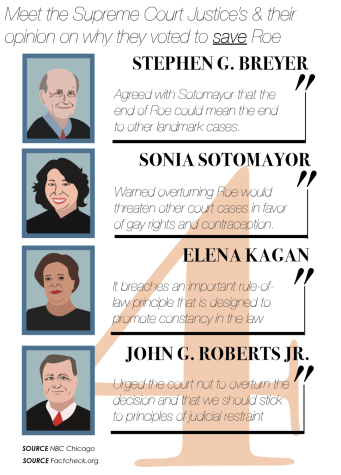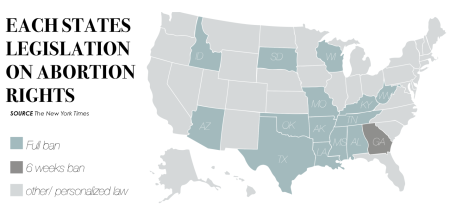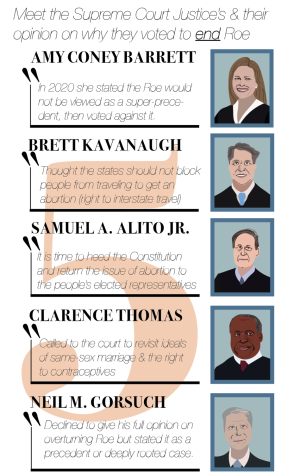Roe V. Wade
Dobbs v. Jackson’s Womens Health Organization takes down five decade old court case
Roe’s reversal has shaken ground and will most likely leave a mark on American history. In a future of uncertainty, each state has a choice to make. Future voters can be a part of that choice.
October 11, 2022
The votes are in.
In a 5-4 majority, Roe v. Wade came to a screeching stop on June 24, 2022. 49 years later, women are now dealing with the repercussions of living in a post-Roe world.
This opinion was leaked in May, 2022 by Samuel A. Alito, writing for the majority, ruled in Dobbs v. Jackson Women’s Health Organization that the decision about abortion would return to the state level. For all purposes, abortion would not be equally accessible across the country. Alito argued that the right to an abortion was not guaranteed by the U.S. Constitution.
The end to Roe was determined by Dobbs v. Jackson. This ruling has caused a split in public opinion, and with mid-terms approaching in November, abortion rights could be at the forefront.
UNDERSTANDING ROE
The Supreme Court that instituted Roe v. Wade in the 70’s held that criminalizing abortion violated a womans’ constitutional right to privacy. They ruled, in a 7-2 decision, that restrictive state regulation was unwarranted. AP United States Government and Politics teacher, Dalton Pool shares the logistics around how this court ruling has changed as of this year.
“Overturning a precedent that has stood for 50 plus years is very radical and has only happened a few times in the Court’s history,” Pool said.
Dobbs v. Jackson split the Supreme Court and one vote determined the future of Roe. Five justices voted to overturn Roe: Amy Coney Barrett, Samuel A. Alito Jr., Brett Kavanaugh, Neil M. Gorsuch, and Clarence Thomas. Three of those Justices were recently appointed by former president Donald Trump. However, these justices did not vote to end abortion directly.

“The decision by the Supreme Court to undo Roe v. Wade does not ban abortion,” Pool said. “Instead it returns the power to regulate abortion back to the state.”
This clarification sets up the states to create its own standards for abortion, shaping a possibly disproportionate view on womens access to equal healthcare.
“Some states will continue to allow abortion providers the ability to operate,” Pool said. “But others will create [or have already created] laws making abortion illegal.”
Some argue that allowing the states to make this decision and the people of each state have their own views represented. For example, if 90% of Californians want no bans on abortion and they vote for the representatives that want that same thing, they would get it and vice versa. According to New York Times, as of September 23, 14 states have already enacted laws that ban abortions at about six weeks. This includes Texas which has banned abortion with no exceptions for rape or incest.
“It feels like a step back in women’s ability to make choices about their own bodies, and how it could affect me in the future,” sophomore Neela Lerma said. “It’s a lot scarier for me if I end up getting pregnant down the line.”
According to English teacher Chelsea McCaffrey, this ruling is affecting female identifying students and students that could get pregnant.
“It really sends a message to them,” McCaffrey said. “And the message is that they don’t have the same rights as the other half of the population. It’s also putting them in a place where they have to make some really important choices. I feel like no teenager should have to.”
Here at home, Texas trigger laws have already gone into effect. Abortion clinics have closed their doors. And now, performing an abortion is a felony punishable by up to life in prison.
“I feel like this case could lead to other court decisions being overturned, like the rights to birth control,” senior Annika Ybarra said. “That’s not fair. If something were to ever happen to me in the future, I would want the option to make a choice that’s best for me.”
TRIGGER LAWS
“Trigger laws” only go into effect once something happens. In this, that specific event will “trigger” it into becoming an enforceable law. In this circumstance, the leak of Roe v. Wade decision gave state legislatures the opportunity to draft these laws.
The threat of trigger laws doesn’t only reside with Roe; according to Stat News, Supreme Court Justice Clarence Thomas cited that “In future cases, we should reconsider all of this Court’s substantive due process precedents, including Griswold, Lawrence, and Obergefell,” touching on the right to contraception and same sex marriage. This could open the door to state lawmakers imposing trigger laws against these two things.
“I know that there were some discussions on access to birth control,” McCaffrey said. “It’s really unfortunate since you know, birth control can help regulate things like your period.”
Although people may choose to use contraceptives for a variety of reasons (like a period) the purpose has remained the same since the 1950’s. Birth control has been used to prevent unwanted pregnancies. With that, the advantages of taking birth control are known to help with menstrual cramps, hormone imbalance, and preventing the chance for ectopic pregnancy.
“When I was on birth control as a teenager, it was to help with my heavy periods,” McCaffrey said. “No one wants to feel miserable, and not be able to perform at school. Because of that, it shouldn’t be something that is inaccessible.”
In a study done by CalMatters, younger women expressed that getting pregnant early on in college would put them at risk for poverty, housing instability, and unachieved career goals.
“I am worried that something could happen to me and I wouldn’t be protected,” Ybarra said. “ Rape is very high in Texas and they’re doing nothing about it to protect women.”
In 2020, Statistica documented the highest number of forcible rape cases to Texas, with 13,509 cases. Roe gave women the right to choose. Without that, they are instead given the choice to have a child they may not be able to support or die trying.
“If you were to be impregnated by a rapist, you have no options; you just have to carry that burden,” Ybarra said. “You carry it for the rest of your life. Especially when you don’t even know if you’re pregnant at six weeks.”
According to ANSIRH (Advancing New Standards in Reproductive Health) two-thirds of women in America find out they are pregnant before six weeks. In their findings, they indicated that younger people could not find out sooner because of accessibility.
Since June, natural miscarriages have been deemed criminal offenses by three states, including Texas.
“I’ve seen women who have had miscarriages not by choice getting arrested for no reason because these trigger laws make any woman who was originally pregnant then no longer pregnant face penalties,” Ybarra said. “It makes me upset because it’s like we can’t control what happens to our bodies and how it processes pregnancy.”

STUDENTS PROTEST
The leaked opinion on Roe hit student advocacy hard. So much so that on May 12 students held a 49 minute protest in the courtyard to represent the 49 years of Roe. Sophomore Neven Mulhall-Sviglin describes his first protest.
“The day we went to protest was when I realized these rights were no longer protected,” Mulhall-Sviglin said. “I had heard about the decision earlier but I fully understood it the day of the protest.”
The protest started at the end of second lunch and pushed through seventh period. Students from all classes came to support.
“There were so many people and it definitely proved a point,” Mulhall-Sviglin said. “It proved that the number of people against it was a lot higher than the people who stood for it, I could tell that people cared a lot.”
According to Mulhall-Sviglin, Even though he was a freshman during the protest he learned a lot about how much people cared, leading to an awakening of his own.
“I learned that no matter how many people were going to be against Roe, it was still going to be changed,” Mulhall-Sviglin said. “It was a lot for me but I learned the importance of rights. But now, If something else were to happen in the future, I feel helpless against it.”
In a poll done by the Pew Research Center, a majority of Americans (61%) still believe that abortion should continue to be legal. The dobbs decision is not reflected in this.
“I think that it would have been different if they had jurors that understood the youth generation,” Mulhall-Sviglin said. “I think abortions should be restricted after a reasonable amount of time, but also put into consideration the womans background.”

CREATING CHANGE
Changing this decision is not impossible. It may take time but instituting a federal law to protect abortion rights could happen.
“Passing a federal law would require both chambers to approve a bill on abortion and then the President would have to sign it,” Pool said.
With midterms coming up on November 8, it has the power to reshape Biden’s second term as president but also shift the houses. All 435 seats in the house of representatives and 34 seats in the senate will be up for grabs. 34 of the 50 states will elect new governors including Texas. What all of this means is that if all stars are aligned, new members of congress could come together to approve a federal law that makes all states share the same regulations for abortion.
“If someone doesn’t like what their state is doing, then they should get more involved with state politics or pressure their state representatives to act in a certain way,” Pool said. “Voting is super, super important and has major consequences.”
Roe’s reversal has shaken ground and will most likely leave a mark on American history. In a future of uncertainty, each state has a choice to make. Future voters can be a part of that choice.
“After seeing everything that has transpired in the last few years, it’s hard to be hopeful,” McCaffrey said. “But, my hope is that there is enough movement to codify it into law,” I do hope that laws can be put into place and something changes.”










